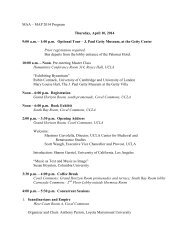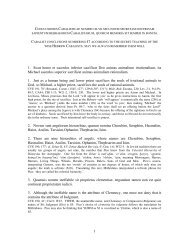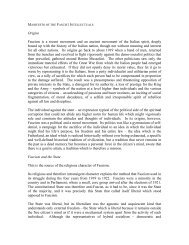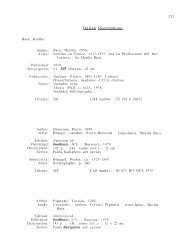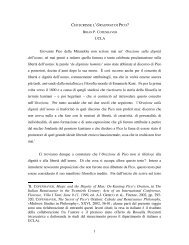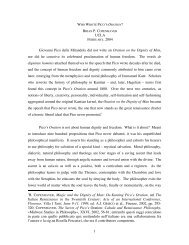1 (1) Pythagoras of Samos instructed the region of Italy once called ...
1 (1) Pythagoras of Samos instructed the region of Italy once called ...
1 (1) Pythagoras of Samos instructed the region of Italy once called ...
You also want an ePaper? Increase the reach of your titles
YUMPU automatically turns print PDFs into web optimized ePapers that Google loves.
(12) Then I was on <strong>the</strong> point <strong>of</strong> saying that <strong>the</strong>re seem to be a few extraordinary cases,<br />
exceptions to <strong>the</strong> rule, as with <strong>the</strong> pronouns ‘mine, ‘yours,’ and ‘his,’ to which ‘ano<strong>the</strong>r’s’<br />
is related: ‘I gave mine,’ ‘I did not give yours,’ ‘he never gives his, but ano<strong>the</strong>r’s,’ as in<br />
Sallust: ‘coveting ano<strong>the</strong>r’s, having squandered his own.’ 71 But <strong>the</strong>re is also a particular<br />
cause behind this in that <strong>the</strong>se words, unlike those mentioned above, do not signify a<br />
bodily or, so to speak, a substantial thing, since ‘mine,’ ‘yours,’ ‘his’ and ‘ano<strong>the</strong>r’s’<br />
have as much to do with quality and action as with substance, as in ‘lying is not my<br />
[way].’<br />
(13) Moreover, <strong>the</strong>re is a ano<strong>the</strong>r reason why <strong>the</strong>se words cannot be brought under <strong>the</strong><br />
rule, as it seems, when <strong>the</strong> substantive in question does not agree with its referent in<br />
gender, as in <strong>the</strong> passage <strong>of</strong> Homer that I mentioned, ‘to be many-mastered is no good.’ 72<br />
Also in Vergil:<br />
For barnyard beasts <strong>the</strong> wolf is grim,<br />
And storms for field plants ripe;<br />
For us unhappy Amaryllis<br />
Blows like wind through trees.<br />
Water’s sweet when kids are weaned,<br />
Sweet <strong>the</strong> strawberry tree;<br />
Pliant willows feed birthing herds,<br />
Amyntas alone feeds me.<br />
And elsewhere in Vergil:<br />
… inconstant and ever mutable is<br />
woman,<br />
and in Cicero: ‘Death seems evil to me,’ and also ‘Is it evil because it is grievous.’<br />
(14) This also occurs when <strong>the</strong> reference is to an infinitive, as in Juvenal:<br />
Leaning on ano<strong>the</strong>r’s reputation is a thing to be pitied,<br />
71 Zippel cites Sall. Cat. 5.4.<br />
72 Valla translates <strong>the</strong> first three words <strong>of</strong> two lines from <strong>the</strong> Iliad which he has already quoted (2.1) in<br />
Greek: ouk agathon polukoiraniê. The second word, meaning ‘good,’ is a neuter adjective, but <strong>the</strong> noun to<br />
which it refers, ‘<strong>the</strong> rule <strong>of</strong> many,’ is feminine; Valla mirrors this incongruity in Latin with a neuter<br />
adjective (bonum) and a masculine noun (principatus). The passages that follow from Vergil, Cicero and<br />
Juvenal make <strong>the</strong> same point. The word (suppositum) translated here as ‘referent’ is <strong>the</strong> past participle <strong>of</strong> a<br />
verb (suppono) common in classical Latin, but <strong>the</strong> classical word is by no means equivalent to <strong>the</strong><br />
suppositum <strong>of</strong> medieval logic and grammar, a major point <strong>of</strong> contention among <strong>the</strong> philosophers whom<br />
Valla attacks.<br />
18<br />
2/21/05 9:35 PM 18/44



